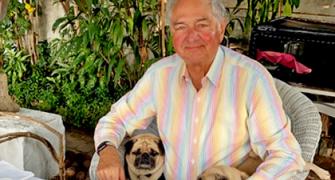When Puja Tandon did her doctorate studies on local lore about the effect of brass pots on bacterial populations, the uproar her results created was far beyond anything she might have expected.
She got the idea from her advisor, Dr Robert Reed, who himself first heard of it in 1997 from a Cochin-based researcher, Shibu Mani.
Reed, Tandon and their colleague Sanjay Chhibber found that live E coli bacteria in vessels made of brass -- an alloy of copper and zinc -- were nearly undetectable after 48 hours.
This effect was not seen in water stored in plastic or earthen pots. Reed puts the bactericidal properties of the brass pot to the copper present in it. Copper forms about 70 percent of the alloy though not much may find its way into the water.
"It would seem that these low levels are enough to inactivate bacteria but they are well below the levels required to cause harm to people," said Reed. He points out that bacteria were far more likely than humans to be affected by the small amounts of copper released.
"I guess it is to do with relative size. In the case of the bacteria, they are swamped by the solution; but in our case, it is only a litre or two, and well within our capacity to cope," he adds.
Tandon explains this as oligodynamics -- when an agent is active in very small quantities. "Small amount of copper ions leach out of brass vessel walls into water containing bacteria. They couple around bacterial molecules and inactivate them," she says.
While this backs a traditional view, as often happens in science, self-congratulation has to be tempered with a dash of candour.
True, the traditional brass pots can kill most bacteria in 48 hours, but clear water left in a transparent plastic bottle on a hot roof can do the job faster.
"Sunlight works within less than a day -- 5-6 hours in full sunlight," says Reed.
He has been working on the idea for years now before deciding to act upon Mani's advice that stresses that the combination of heat and ultraviolet radiation can cook bacteria in a way that slow poisoning with copper might not.
Reed provided pictures of children in Jodhpur who take such sunlight-sterilized water in discarded bottles to school. Of course, this called for uninterrupted sunlight, high temperatures and a clear path through the solution. But brass pots had a toxic effect on bacteria even when such conditions did not exist.
Tandon, the youngest child in her family, is from a small town called Doraha in Punjab, about 20 kms from Ludhiana. After earning an MSc in Botany, she is now working on her PhD in Applied Sciences from Northumbria University, Newcastle.








